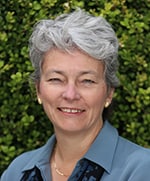

Interview with Marice Ashe, JD, MPH |
| Founder and CEO of ChangeLab Solutions Education: BA, University of Notre Dame; MPH and JD, University of California, Berkeley Public Health Law News (PHLN):Please describe your career path and what drew you to public health law. Ashe:During the early years of the environmental justice movement, I worked as a liaison between a local health department and low-income residents living near petrochemical facilities. I was trained as a health educator and community organizer. I got lost in all of the legal jargon, and I was more confused than successful. That experience motivated me to go to law school so I could bring understanding of law to public health and social justice movements. PHLN:What led to founding ChangeLab Solutions? Ashe:In the early 1990s, California passed a tobacco tax that earmarked funds for prevention. The state health department wanted lawyers to provide technical assistance services to local health departments and community-based coalitions that were organizing to get rid of tobacco billboards. They reached out to Steve Sugarman at my alma mater, the University of California at Berkeley School of Law, for assistance. He reached out to the Public Health Institute, where I was working, and together we developed strong and productive relationships between scientists, advocates, and lawyers working together to change the world. It was beautiful! PHLN:What does your typical day look like as the CEO of ChangeLab Solutions? Ashe:I have the honor of working with one of the most brilliant and creative team of people ever. We think very big, our work is very complex, and we are constantly pushing our boundaries. It’s exhilarating—and really hard work! PHLN:How does ChangeLab Solutions stand out in the field of public health law? Ashe:We stand out in at least two different ways. First, we are multidisciplinary. Our team consists of attorneys, public health professionals, land use planners, transportation and housing specialists, economic development leaders, educators, architects, public administrators, researchers, and policy wonks of all sorts. We aim to reflect professional specialties that mirror those of local government agencies. Second, we draft model laws, policies, and related resources that address the social determinants of health and health equity. Our goal is to seed the field with examples of public policies that will move the needle on health outcomes, with a focus on increasing equity. PHLN:What does a true cross-disciplinary team look like in public health law? Can you give an example of ChangeLab’s multidisciplinary team in action? Ashe:We organize ourselves into “labs.” For example, we have a Sustainable Neighborhoods Lab that takes an integrated approach, providing legal and policy tools related to land use and transportation planning, housing stability, and access to parks, neighborhood safety, and community violence prevention strategies. Our staff specialists can work through tough issues in a cross-sectoral format so our resources are relevant to many different types of civic and community-based leaders. PHLN:What are model laws and policies? How are these used to benefit communities? Ashe:Model laws and policies are starting places for action. They capture the best available evidence, including that of the lived experience of community members. The models include all the legal “bells and whistles” that a city or state attorney would need for addressing a particular problem. The models also include comment boxes throughout the document, which offer guidance to health leaders and their attorneys on ways to tailor the model to their jurisdiction’s specific needs. PHLN:As you will soon be leaving ChangeLab Solutions to work on other projects, what do you hope to see in the next phase for the organization? Ashe:I am super excited about ChangeLab’s future as we are in the midst of what I call our “next generation of thinking.” We are now designing our model laws and policies—and all the allied support materials—using an “equity-first” lens. Over time, we expect this new work to have a profound effect on health equity and racial justice. PHLN:How would you define equity in public health? Ashe:There are several excellent definitions of equity available that emphasize justice and fairness, and call on us to create the economic and environmental conditions by which everyone can be healthy. All the various definitions work, in my opinion. A key point is that the same language can’t be used in every place or context. Many variables affect how to talk about equity with different communities, so we have to be sensitive to using language that will help a particular community move forward in its understanding and action to redress inequities. PHLN:How is ChangeLab Solutions applying equity principles to its public health law research and incorporating equity frameworks in its tools? Ashe:One of our “labs” is the Justice and Equity Think Team (JETT). JETT has developed straightforward principles for our equity-first lens and has created a product audit guide to help us revamp and update historic materials using this new lens. We are drafting a blueprint for future action and working with legal academics and a national advisory board to guide our efforts. PHLN:Can you give a specific example of this theoretical application and the outcomes you hope it will bring? Ashe:We know that place-based epidemiologists—that is, epidemiologists who study data showing that your zip code is more important than your genetic code—have rarely if ever talked with civil rights scholars to learn how they can work together and influence each other. I hope public health data can reinvigorate civil rights law with new ideas about how to use the law to improve health. PHLN:What spurred ChangeLab Solutions’ implementation of the equity-first model? Ashe:Because our fundamental commitment is to use the tools of law and policy to improve community health, we recognize that we have to learn how to use those very tools to confront and dismantle both the historic and the current use of law and policy to institutionalize racism and concentrate and maintain poverty. We’ll never improve community health until such tools are in place and creating positive changes in communities across the nation. PHLN:What advice would you give to others hoping to apply an equity-first lens to their organization and research? Ashe:Embrace fearless learning. I say this to my staff all of the time. If we are satisfied with the status quo, we won’t have impact. We have to be willing to move into undefined and sometimes scary places to make real change. PHLN:Have you read any good books lately? Ashe:I am reading The Common Goodby Robert Reich. For fun, I recently read Circeby Madeline Miller. PHLN:The founding and sustainment of ChangeLab Solutions is an outstanding accomplishment. Over the course of your career, is there a moment that stands out to you as a testament to that achievement? Ashe:I love it when a light switch turns on in people’s brains about how to work with public policy. I can see it in people’s faces, the moment they feel the power of their advocacy and know they have good tools to guide their way. It’s a wonderful thing! PHLN:Do you have any hobbies? Ashe:I am learning yoga, and I like to grow vegetables. Lettuce, beans, and tomatoes in the summer. Chard and kale in the winter. Delicious! PHLN: Is there anything you’d like to add? Ashe:It has been an honor to be part of the renewed public health law movement. CDC played a major role in reinvigorating our field, and I’m very grateful for the last many years of leadership the agency has offered to those of us working in the field. Thank you very much! |





















.png)









No hay comentarios:
Publicar un comentario